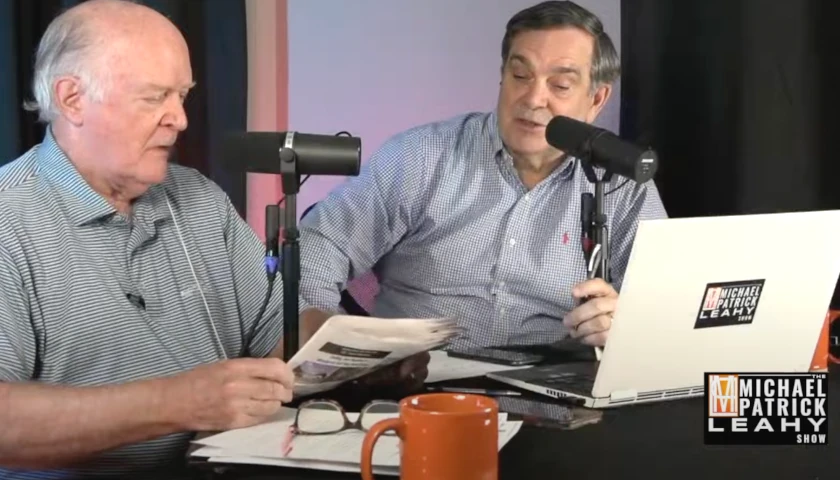Live from Music Row, Monday morning on The Tennessee Star Report with Michael Patrick Leahy – broadcast on Nashville’s Talk Radio 98.3 and 1510 WLAC weekdays from 5:00 a.m. to 8:00 a.m. – host Leahy welcomed the original all-star panelist Crom Carmichael to the studio for another edition of Crom’s Crommentary.
CROM CARMICHAEL:
Michael, over the weekend I was reading different articles, here are a couple of headlines and I’ll get to the meat of the issue. IMF is not a right-leaning organization at all. “IMF Urges Biden Administration to Cut Spending to Help the Fed Bring Down Interest Rates and Inflation. Former CEO of Home Depot Issues Grim Warnings Over US Bankruptcies.”
The former CEO continued by saying that the complexity of the US economy is different than any time I have seen in my 52 years. According to UBS analysts, more than 50,000 retail locations could permanently shut their doors over the next five years. This closure would cut the current US store count of about 940,000 by five percent.
And then the last one is a headline that says, “US Regulators Calls for Greater Security of Hedge Funds After the Bond Turmoil of FT.” Then there’s this article, which is the meat of the question, and that is we know that the federal deficit is completely out of control. We know that interest rates are climbing, which is also contributing to the federal deficit being completely out of control.
And we had the Biden administration and the left in general that is calling for higher taxes saying that the rich don’t pay their fair share. Now I have two comments about that. One is it depends on who you define as rich. If you talk about earned income the rich certainly are paying a great deal of the income tax.
If you’re talking about unrealized gains of the super super wealthy, they’re not paying anything. And so if you really want to tax the super wealthy and make it fair then you would tax their unrealized gains at a very significant rate. Jeff Bezos, for example, has paid almost no taxes during his entire life compared to his net worth.
The same thing would probably be true for Bill Gates and Mark Zuckerberg and a lot of the other Big Tech moguls now. But here’s what’s interesting. Most of the 180 million taxpayers will be lower earners as about 70 percent are expected to earn less than a hundred thousand dollars.
In the aggregate, they will earn nearly 30 percent of the income of individual taxpayers and will pay one point five percent of the income taxes. Let me say that again. They’ll earn 30 percent of total income and they’ll pay one point five percent of the total taxes. About one-quarter of the filers will earn between $100,000 and $500,000, and they’ll be expected to have nearly half the aggregate income and owe nearly half of the income taxes.
The top earners are where the rubber really hits the road in terms of earnings, I’m not talking about unrealized gains and stock market gains, will owe the most compared with their share of income, a small group, there are about 900,000 filers earning a million dollars or more. They have 16 percent of the income and they will pay 40 percent of the income taxes paid.
And so when you look at income taxes, not necessarily the wealthy, but the high earners are earning the most. What’s interesting is over time and going back to 1900, the income tax was passed into law by a constitutional amendment, I believe it was 1913 and then during that period of time, the income tax rate varied from as low as seven percent and the top marginal tax rate from us low as seven percent to as high as 92 percent.
But what’s interesting is once the marginal tax rate gets above 25 percent, the amount of money collected by the income tax as a percentage of the GNP. In other words, when you’re looking at a really broad-based look at the income tax, it ranges between 10 percent and 12 percent of GNP. That’s all it does. It bounces around.
Even at 25 percent, it’s 10 to 12 percent. At 92 percent, it’s 10 to 12 percent. So the question is why is that? Because the tax rate’s almost four times as much at 92 percent than 25 percent. And the answer is people change their behavior. And so if you’re going to tax my income, for example, and I’m not using me Crom Carmichael, I’m saying a person who’s making say more than a million dollars, if you’re gonna tax their income at a progressively higher and higher rate, then I’m going to change my behavior so that I’m not going to be earning very much more than a million dollars.
Had you taxed me at 25 percent or 30 percent, I might have earned $5 million and paid 25 to 30 percent on that. But if you taxed me at 90 percent or even 70 percent, could we have history on that above a million dollars, I’m not going to earn much more than a million dollars.
And so would you rather have 25 percent of a large number or would you have 70 percent of a very small number? And the answer is mathematical. You’d rather have 25 to 30 percent of a large number rather than 70 percent of a small or nothing. And here is the problem. You look at our country today, people are leaving California because of the high taxes.
They’re leaving New York because of high taxes. People do change their behavior. The left either doesn’t want to take that into account or they want to use the rich as a whipping boy. Now, the super-rich, like George Soros and Warren Buffet don’t pay hardly any taxes at all compared to their enormous wealth, and therein lies the rub.
Listen to today’s show highlights, including this Crommentary:
– – –
Tune in weekdays from 5:00 – 8:00 a.m. to The Tennessee Star Report with Michael Patrick Leahy on Talk Radio 98.3 FM WLAC 1510. Listen online at iHeart Radio.





